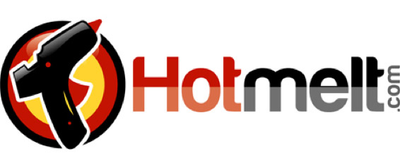Industrial Hot Melt Products and How They Are Used
Industrial hot melt is used in applications formulated for specific purposes in each industry. There are a wide variety of dispensing machines, glue sticks, and bulk hot melt adhesives (HMAs) all designed with specific applications in mind. There is a difference in color, viscosity, heating temperature, raw materials and set time among the various HMAs.
Why are hot-melt adhesives used instead of solvent-based adhesives? There are several advantages.
- longer shelf life
- can be disposed of easily, usually without special precautions (disposal considerations are extremely important)
- do not lose thickness while solidifying (solvent-based adhesives lose 50-70% of layer thickness)
There are some disadvantages to HMAs.
- loss of bond strength at higher temperatures (the solution consists of using an adhesive that requires curing)
- may not be resistant to weather and chemical attacks
Hot-melt adhesives are used for permeable and porous substances. They can bond a variety of substances such as glass, wood, ceramics, metal, rubber and plastic. Which hot-melt adhesive is used in the industrial application depends on the final product. For the food industry, non-toxicity is important. In the textile industry, for a garment that may be dry cleaned, resistance to dry cleaning solvents is important. For diapers, biodegradable HMAs are important. Here are some HMA industrial applications:
- carton sealing
- label applications
- bookbinding spine gluing
- woodworking laminating applications
- disposable diapers
- affixing electronic parts and wires
- assemble and seal corrugated boxes
- automotive
- textiles
- footwear
- electronics
- food and beverages
Some HMAs may be hot melt glue sticks that come in all varieties of shapes, sizes, and formulations. Some work with difficult to bond substrates such as glass and metal. These require a high temperature to function properly. For example, those little candles with wicks in glass containers that you see at Christmas time might have been created with a glass to metal HMA. The wick is attached to a zinc disc at the bottom of the container. The HMA required is one that will secure the wick via the metal disc to the glass bottom quickly, but also effectively, so that the hot candle wax can be poured into the container. It is necessary that the wick not shift. There is a certain window of time required, not too long and not too short, for the specific application.
Another example has to do with carton applications. All retail stores require solid cartons to hold their products which are delivered via big rigs. The carton sealant cannot be too light or the carton will open from the weight of the contents. Likewise, the carton seal cannot be too heavy or "stiff" because those cartons have to be opened by real people at the final destination, at the supermarket or retail store. The speed of the workers is related to the ease of opening the boxes. When a crew is dealing with dozens or hundreds of boxes, "opening speed" makes a huge difference in the overall completion time. Like all HMA applications, there is the perfect adhesive for any particular job at hand, including sealing cartons.
Some applications do not require glue sticks, but bulk hot melts. These differ in color: amber, beige, black, tan, off-white, yellow, clear and white. They also differ in the set time, temperature, and type, such as pressure-sensitive or not. Heat and cold resistance may also form some of the differing characteristics of HMAs. Bulk hot melts are used with hot melt dispensing machines. Bulk hot melt dispensing machines include tanks, tankless varieties, hoses, guns and modules. When you know your application, but are not sure what the best HMA approach to use is, contact us as we have adhesive engineers who can help solve your hot melt needs. We can even design something specific to your industry if you are not able to find something suitable among our large array of options.
The HMA market is growing.
The factors behind this growth are growth of end-use industries and the expansion of the packing industry. Plus, there is a demand for environmentally friendly adhesives. As mentioned earlier, HMAs can usually be disposed of without difficulty, which is not true of other adhesives which can require specific disposal steps to meet environmental standards. That alone should make any industry sit up and take notice, as environmental fines can be steep plus include a probationary period before the company is considered "clean" again.
HMAs are being used in emerging economies. For example, HMAs are used in light weight and fuel-efficient cars. HMAs are used for speedy set up and durability. They are used in car seats. They are used for joints. The non-woven and packaging industries are emerging industrial sectors for HMAs.
Because HMAs are used for a multitude of purposes, from the manufacturing, industrial standpoint, it is vital that HMA equipment work properly and consistently. Quality and performance are paramount. One poorly transacted order where seams split and adhesives do not hold will end a profitable relationship between supplier and consumer. Therefore, if you need a certain type of equipment and HMA to correctly do your job, contact us. We offer all varieties and brands of equipment and HMA, both glue sticks and bulk. We are one stop shopping for HMAs and can help you meet your specific industrial requirements.
Contact us for any questions regarding industrial bulk hot melt products.

